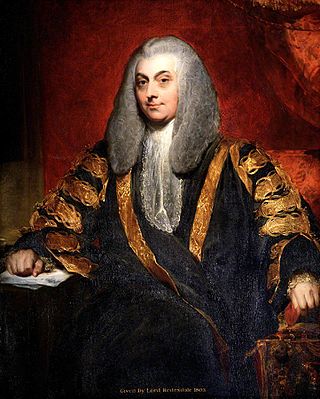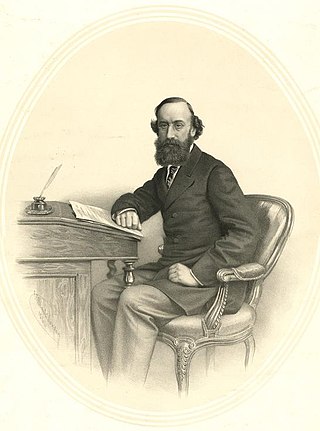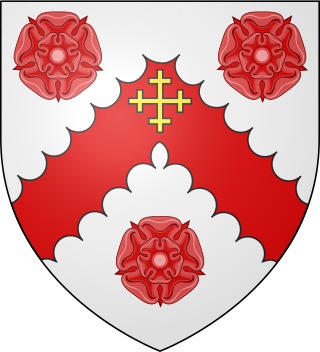David Leslie Moreton, 7th Earl of Ducie (born 20 September 1951) is a British peer, landowner, and farmer. He was a member of the House of Lords from 1991 to 1999. He was previously known as Lord Moreton.
The son of Basil Moreton, 6th Earl of Ducie, and his wife Alison Bates, he was educated at Cheltenham College and Wye College, where he graduated B.Sc. in agriculture in 1973. [1]
Becoming a career farmer on his father's estate in Gloucestershire, on 12 November 1991 he succeeded as the Earl of Ducie (created 1837), Baron Ducie (1763), and Baron Moreton of Tortworth (1837). [1]
In 2003 Ducie was living at Talbots End Farm, Cromhall, Gloucestershire. [1] Although the family seat, Tortworth Court, was sold after the Second World War, much of its estate, including a nearby lake and woodland, remains in the hands of Tortworth Estates Ltd, of which Ducie is a Director. [2]
On 26 April 1975, as Lord Moreton he married Helen Duchesne, a daughter of M. L. Duchesne, and they have two children: [1]

Earl of Ilchester is a title in the Peerage of Great Britain. It was created in 1756 for Stephen Fox, 1st Baron Ilchester, who had previously represented Shaftesbury in Parliament. He had already been created Baron Ilchester, of Ilchester in the County of Somerset in 1741, and Baron Ilchester and Stavordale, of Redlynch, in the County of Somerset, in 1747. These titles were also in the Peerage of Great Britain. All three peerages were created with remainder, failing heirs male of his own, to his younger brother Henry Fox, who was himself created Baron Holland in 1763. The brothers were the only sons from the second marriage of the politician Sir Stephen Fox.

Earl Winterton, in the County of Galway, is a title in the Peerage of Ireland. It was created in 1766 for Edward Turnour, 1st Baron Winterton, who represented Bramber in the House of Commons. Turnour had already been created Baron Winterton, of Gort in the County of Galway, in 1761, and was made Viscount Turnour, of Gort in the County of Galway, at the same time as he was given the earldom. These titles are also in the Peerage of Ireland. Born Edward Turnour Garth, Lord Winterton was the son of Joseph Garth and Sarah Garth, daughter of Francis Gee and his wife Sarah, daughter of Sir Edward Turnour, Member of Parliament for Orford, elder son of Sir Edward Turnour, Speaker of the House of Commons from 1661 to 1671. His mother was sole heiress to the Turnor estates and on her death in 1744 he assumed by Royal licence the surname of Turnour.

Earl of Ducie is a title in the Peerage of the United Kingdom. It was created in 1837 for Thomas Reynolds Moreton, 4th Baron Ducie.
Charles John Pelham, 8th Earl of Yarborough, styled Lord Worsley between 1966 and 1991, is a British peer and landowner. He was a member of the House of Lords from 1991 to 1999.

John Freeman-Mitford, 1st Baron Redesdale, PC, KC, FRS, known as Sir John Mitford between 1793 and 1802, was an English lawyer and politician. He was Speaker of the House of Commons between 1801 and 1802 and Lord Chancellor of Ireland between 1802 and 1806.

Earl of Cavan is a title in the Peerage of Ireland. It was created in 1647 for Charles Lambart, 2nd Baron Lambart. He was made Viscount Kilcoursie, in the King's County, at the same time, also in the Peerage of Ireland. Lord Cavan was the son of Oliver Lambart, who had been elevated to the Peerage of Ireland as Lord Lambart, Baron of Cavan in the County of Cavan, in 1618.
David Charles Carnegie, 4th Duke of Fife is a British peer and businessman. He is the only surviving son of the late James Carnegie, 3rd Duke of Fife, and his former wife Caroline Dewar. He was styled Earl of Macduff until 1992, and then Earl of Southesk until succeeding his father on 22 June 2015 as the fourth Duke of Fife and Chief of the Clan Carnegie. A descendant of Edward VII, he is the highest person in line of succession to the British throne who is not a descendant of George V. He is a third cousin of King Charles III.

Henry John Reynolds-Moreton, 3rd Earl of Ducie, styled Lord Moreton between 1840 and 1853, was a British courtier and Liberal Party politician. He notably served as Captain of the Yeomen of the Guard from 1859 to 1866, and Lord Warden of the Stannaries from 1888 to 1908.

Luke Richard White, 6th Baron Annaly, is a British hereditary peer and former Government Whip in the House of Lords, who sat on the Conservative benches.

Admiral Maurice Frederick FitzHardinge Berkeley, 1st Baron FitzHardinge, was a Royal Navy officer. As a junior officer he commanded gunboats on the Tagus, reinforcing the Lines of Torres Vedras, in Autumn 1810 during the Peninsular War and, as a captain, he served on the coast of Syria taking part in the capture of Acre in November 1840 during the Oriental Crisis. He also served as Whig Member of Parliament for Gloucester and became First Naval Lord in the Aberdeen ministry in June 1854 and in that role focussed on manning the fleet and in carrying out reforms and improvements in the food, clothing, and pay of seamen.

Henry George Francis Reynolds-Moreton, 2nd Earl of Ducie, styled the Hon. Henry Reynolds-Moreton from 1808 to 1837 and the Lord Moreton from 1837 to 1840, was a British Whig politician, agriculturalist and cattle breeder.
Henry Haughton Reynolds-Moreton, Lord Moreton DL, was a British Liberal Party politician.

Berkeley Basil Moreton, 4th Earl of Ducie, was a British peer and a politician and pastoralist in Australia. He was a Member of both the Queensland Legislative Assembly and the Queensland Legislative Council.

John Baron Dutton, 2nd Baron Sherborne, was a British peer.
Allen Christopher Bertram Bathurst, 9th Earl Bathurst, known as Lord Apsley until 2011, is a British peer, landowner and property developer.

Colonel Frederick Augustus Berkeley, 5th Earl of Berkeley was a British peer and militia officer who served as the Lord Lieutenant of Gloucestershire from 1766 to 1810.

Thomas Reynolds-Moreton, 1st Earl of Ducie was the first Earl of Ducie.

Matthew Ducie Moreton, 1st Baron Ducie (1663–1735) of Moreton, Staffordshire, and Tortworth, Gloucestershire, was a British Army officer and politician who sat in the House of Commons between 1708 and 1720 when he was raised to the peerage as Baron Ducie.

Matthew Ducie Moreton, 2nd Baron Ducie of Tortworth, Gloucestershire, was a British Whig politician who sat in the House of Commons between 1721 and 1735 winning by-elections at four separate constituencies but never winning at a general election. He vacated his seat when he succeeded to the peerage as Baron Ducie.
Julia Reynolds-Moreton, Countess of Ducie, formerly Julia Langston, was an English noblewoman, the wife of Henry Reynolds-Moreton, 3rd Earl of Ducie.